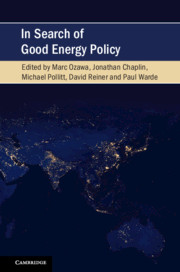Part I - Multidisciplinary Perspectives
Published online by Cambridge University Press: 10 June 2019
Summary
Political science does not offer a distinct subdiscipline to address the subject of energy. Insofar as political science has addressed energy, it has focused on issues often neglected by other disciplines, notably the role of geopolitics and international relations, and the domestic politics of resource-rich states. Apart from the different subfields, we examine different approaches including realism, constructivism, liberalism and Marxism. The rise and fall and rise again of academic articles on energy in leading political science journals is reviewed and linked to exogenous forces such as the price of oil. Two distinct energy topics which have received attention are nuclear power and the oil crises of 1973–79 because of their wider geopolitical ramifications. Perhaps the most prominent or consistent thread through studies of the politics of energy is the question of energy security or energy independence. Finally, in recent years, energy has increasingly emerged as a focus for study in environmental politics and climate change politics in particular.
Keywords
- Type
- Chapter
- Information
- In Search of Good Energy Policy , pp. 23 - 98Publisher: Cambridge University PressPrint publication year: 2019

